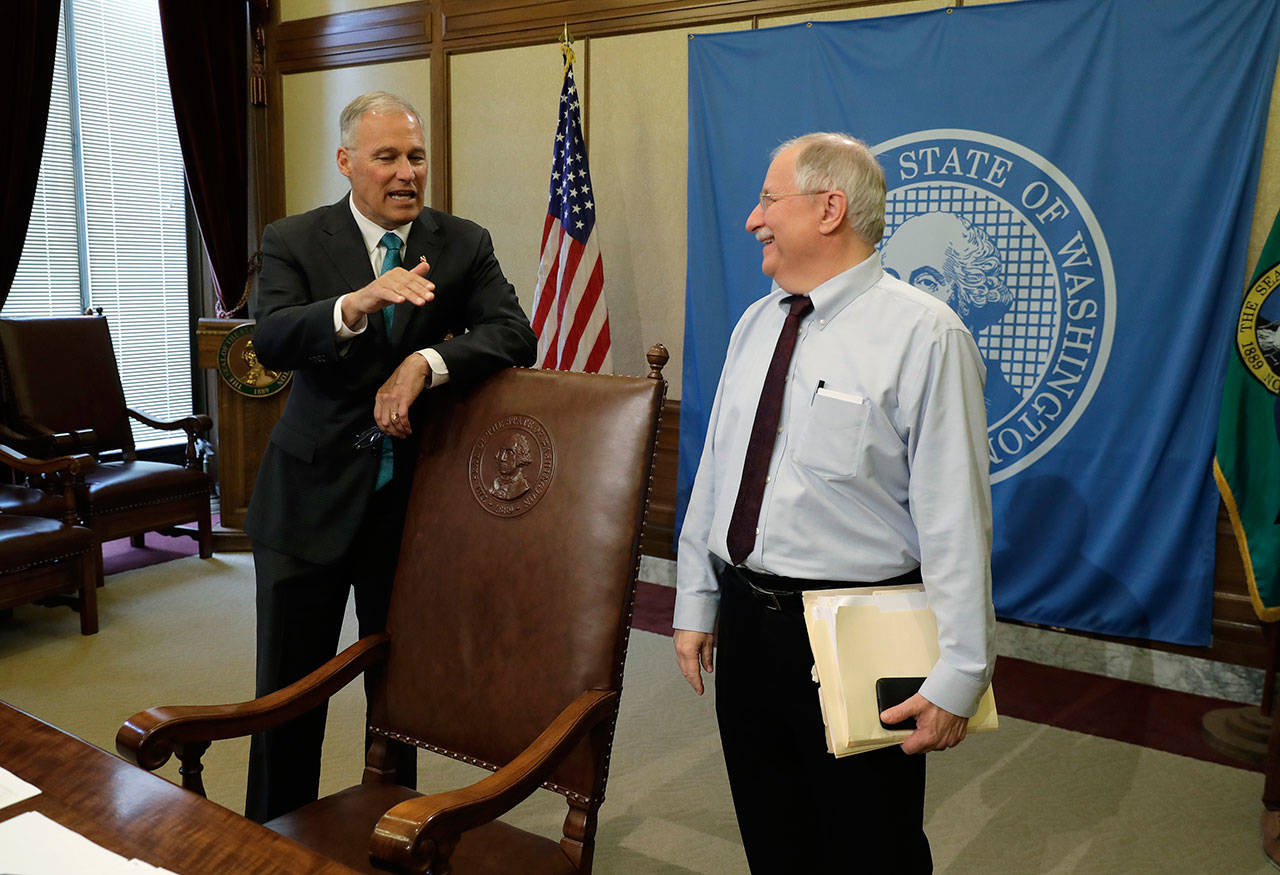The Associated Press
SEATTLE — Gov. Jay Inslee on Tuesday signed the state’s capital, operating and transportation budgets, officially designating funds — and tax increases — to pay for state programs for the next two years.
Along with existing programs, the budgets fund expanded college grants for low and middle-income students, an expansion of the state’s mental health system, and the first phase of hybridizing the state’s ferry system.
“This is a budget that puts people first,” Inslee said as he signed the state’s $52.4 billion operating budget.
But Inslee also called out a looming funding challenge for state: Fixing culverts — large pipes that allow streams to flow under roadways, but can prevent salmon from reaching their spawning grounds. A federal court case means the state has to fix hundreds of culverts around the state, at a cost some estimates have put as high as $3.5 billion. Many of the culverts must be fixed by 2030.
Inslee and legislators in his own party went back-and-forth over how much to put toward the fixes during the Legislature’s regular 105-day session, and in a rebuke to legislators Inslee on Tuesday used budget flexibility to force an increase the total money going to the projects, and warned that legislators would have to add even more money in coming years.
“This is just a down payment on the multi-billion dollar tab legislators left unpaid,” Inslee said. “This does not solve the problem.”
Inslee increased the funding to $275 million over the next two years, more than twice the $100 million the Legislature put in the budget they delivered to Inslee.
Republicans objected to the spending and tax levels in the budgets and accompanying bills, saying that economic growth statewide, in parallel with the thriving U.S. economy, had driven increased tax revenues that should have been enough to sustain government spending without new taxes.
The budget, Braun said, “isn’t good news for the families and employers, who will pay the price one way or another.”
That echoed remarks from Republicans lawmakers throughout the legislative session, as Democratic lawmakers used their control over both halves of the Legislature to shape the state’s budgets around their own priorities.
In Washington’s two-year funding cycle, the 2019 budget is the first full two-year budget that has passed since Democrats gained control of both the state Senate and House in 2018.
Two tax bills targeting wealthy corporations and individuals were included in the package of bills signed by Inslee Tuesday.
One would target professional service companies like accounting, architecture and engineering firms, along with large computing companies, potentially including Google and Amazon, with a tiered up-charge on the state’s Business and Occupation tax. Businesses making more than $100 billion in gross revenues would be in the top tier, and would see a two-thirds increase on their tax rate over current levels.
The revenue from the tax would expand college grants for low and middle-income college students, including providing full-tuition scholarships to all qualifying students from families of four making $50,000 per year or less.
Another tax bill would convert the state’s current flat real estate excise tax to a tiered system, increasing the taxes collected on properties more than $1.5 million, decreasing the collection on properties under $500,000, and leaving the rate for homes in the middle the same.
A major component of the budget was the overhaul and expansion of the state’s mental and behavioral health system, a point of bipartisan consensus during the 105-day Legislative session.
“The expansion that’s the most meaningful in this budget is the commitment to reforming the state’s woefully inadequate behavioral health system, from community-level services all the way up to the state’s mental health institutions,” said Democratic Sen. Christine Rolfes, the chief budget writer in the Senate,
The operating budget includes about $47 million to expand behavioral health facilities in communities around the state, as well as over $150 million to improve state hospitals and comply with the federal court ruling in the Trueblood case, which required the state to shorten wait times for people found incompetent to stand trial.
Long a priority for Inslee, some of that money would help add treatment capacity in communities around the state, in the form of intensive residential facilities, medium-term treatment facilities, and peer support centers, to serve patients who don’t qualify for civil commitment but still need care.

